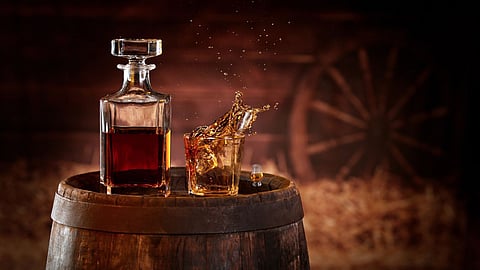

The UK-India free trade agreement (FTA) might make that bottle of Scotch a bit more affordable, but for Indian whisky makers, it’s still business as slow—as far as rules go.
Under the pact, India has agreed to reduce import duties on Scotch, whisky, and gin from a steep 150% to 75% right away, with a gradual reduction to 40% over the next ten years. That could mean a price cut of 8–20% on imported Scotch, depending on the brand and type, according to analysts at Elara Capital. The premium over duty-free “bottled in origin” (BIO) whiskies may shrink from 31% to around 20%.
But while British liquor makers cheer the duty cuts, Indian whisky producers aren’t raising a toast just yet. One of their long-standing gripes—how long whisky needs to mature—remains unresolved.
As per UK and European Union (EU) laws, for any spirit to be legally sold as "whisky", it must be matured for a minimum of three years in wooden casks. That works in cool climates like Scotland, where the ageing process is slow and steady. But in tropical India, where temperatures soar, producers say whisky matures much faster—sometimes in under a year. The heat also leads to higher evaporation losses from the casks, making the process more expensive and inefficient.
Despite that, Indian exporters must still stick to the three-year ageing rule if they want to sell their whisky in the UK or EU. As of now, it’s not clear if the new trade deal makes any exceptions for this.
Prem Dewan, chairman and managing director of De VANS Modern Breweries, believes the playing field remains skewed. “This has not been given any relief on the maturation front for Indian exports to the UK,” he reportedly said. Others in the industry worry that British players will gain an edge, while Indian products remain shut out due to outdated classification rules.
The stock market wasn’t particularly thrilled with the announcement. Several liquor stocks saw a dip following the FTA news. On May 8, Globus Spirits fell 1.65%, SOM Distilleries dropped 4.93%, and even United Spirits Limited—owned by British giant Diageo—slipped 3.34%.
On the brighter side, Indian companies that import alcohol in bulk for blending could see some cost savings. But for those bottling and branding in India or eyeing exports to mature markets, the bottleneck—quite literally—remains the three-year cask rule.